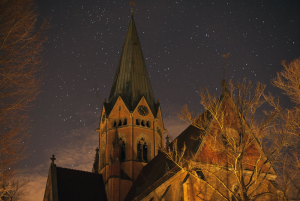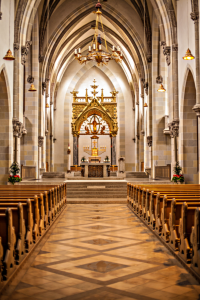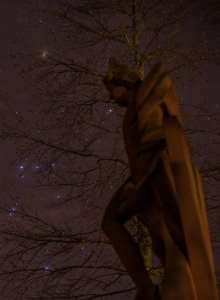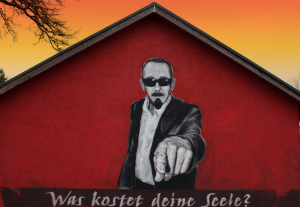The Monastery
Last weekend I checked in for three-day time-out at my local monastery to prepare lent. Our group discussed with the monk the seven sins and the catholic image of the devil in the sixth century under Pope Pope Gregory I, called “The Great”. Because of the general breakdown of civil institutions resulting from the great migrations, the Church assumed an important role. The line of Western emperors had ended in 476. Gregory was born, about the year 540, of one of the few patrician families left in Rome. As a boy he went through the horrors of a siege when Romans were reduced to eating grass. The Goths now advanced into Italy and cities were taken and retaken, the farmlands were laid waste, and the people suffered from pestilence, famine, and looting. For centuries Gregory’s ideals were those of the clergy of the West. His Dialogues, a collection of contemporary visions, prophecies, and miracles, designed to comfort and hearten the Christian reader by showing him God’s mercy, how monks and priests resist the seven deadly sins, became one of the most popular books of the Middle Ages.
The seven deadly sins, also known as the capital vices or cardinal sins, has been used since early Christian times to educate and instruct Christians concerning fallen humanity’s tendency to sin. In the currently recognized catholic order, the sins are usually given as envy, wrath, greed, sloth, lust, gluttony and – if you managed to overcome six of them -the last and gravest, pride. The current way of secular life, or shall I say marketing, tell us that those sins are not undesirable anymore but are virtues. That started in the 80ties, remember Gecko: “Greed is good”?
All seven “sins” are present and are celebrated as if they were achievements and goals. Not only they are not shunned and repudiated, but instead they are glorified as the drivers for our materialistic society. Greed is the hidden main fuel rod for Consumerism.Take greed out and our free market society and the market along with society will stop growing. Like in Rome, globalization interconnected and communicated those attitudes. All the evils of the past are accentuated and intensified by orders of magnitude.
GREED is the desire for material wealth or gain, ignoring the realm of the spiritual. It is also called Covetousness or Materialism.
ENVY is the desire for others’ traits, status, abilities, wealth, family, happiness or other state of mind or situation.
GLUTTONY is an inordinate desire to consume more than that which one requires or is necessary.
ANGER / WRATH is the most feared emotion because it can cause the most physical, mental and psychological harm of any of the seven of them.
PRIDE is excessive belief in one’s own abilities, that interferes with the individual’s recognition of others or God. It has been called the sin from which all others arise.
SLOTH is the avoidance of physical or spiritual work or the refusal to participate in the affairs of the family, society and the world.
LUST / DESIRE is an inordinate craving for the (sexual) pleasures of the body and mind.
What we see now is very similar to the time of Gregory I:
Ethnic and religious tensions
War with shortages of Food and Water
Widening Gap Between the Haves and Have Nots
Shortages of Resources and Energy
Increasing Global Debt and Economic instability
High Unemployment and High Poverty
Mass migration and decrease of fertility
The days at St. Ottilien
A fairly nice group with interesting people as always. The first night was very clear and I went out to make some photographs – the li””ght pollution there is not as bad as the city. On the next morning I learned that a few month ago Brother Norbert died. He was a grumpy but likable man, doing his duty in the second-hand bookstore of the monks. I had a chat with him every time, when I looked for old books at St.Ottilien (one of my many vices) finding sometimes rare old books there. Not anymore the second-hand bookstore deteriorated within a few months overflowing with garbage books given to the monks. I tried to find his grave on Sunday, but did not succeed.Br. Norbert Mascha 1938 – 2013, was forty year missionary in South Africa and Namibia, but had to come back for health reasons. He must have had some adjustment problems, and sometimes it seemed to me not like his duty or Germany at all. Early November I met him the last time, just a few days before he died. Life is always to short to give enough kind words. NorbertMascha-Nachruf.
The Old Enemy
In any case, the three days were wrapped around an excerpt of Pope Gregory’s ( 540-604) bestseller. ” The Life of Our Most Holy Father St. Benedict”:
But Benedict more desirous to suffer afflictions than covetous of praise; and rather willing to undergo labours for the honour of God,
than to be extolled with the favours of this world, fled secretly from
his nurse to a remote place in the desert called Subiaco, distant about
forty miles from Rome, in which a fountain springing with cool and
crystal waters, extendeth itself at first into a broad lake, and
running farther with increase of waters becometh at the last a river.
As he was travelling to this place, a certain monk called Romanus met
him and asked whither he was going. Having understood his intention, he
both kept it secret and afforded him help, moreover he gave him a
religious habit and assisted him in all things. The man of God being
come to this place lived for the space of three years in an obscure
cave, unknown to any man except Romanus the Monk, who lived not far off
in a Monastery governed by Father Deodatus. But he would piously steal
forth, and on certain days bring to Benedict a loaf of bread which he
had spared from his own allowance. But there being no way to the cave
from Romanus his cell by reason of a steep and high rock which hung
over it, Romanus used to let down the loaf by a long cord to which also
he fastened a little bell, that by the sound of it, the man of God
might know when Romanus brought him the bread, and going out may
receive it. But the old enemy, envying the charity of the one and the
refection of the other, when on a certain day he beheld the bread let
down in this manner, threw a stone and brake the bell. Notwithstanding,
Romanus afterwards failed not to assist him in the best manner he was
able.
”Easter”
Now when it pleased Almighty God that Romanus should rest from
his labours, and that the life of Benedict should be manifest to the
world for an example to all men, that the candle set upon a candlestick
might shine and give light to the whole Church of God, our Lord
vouchsafed to appear to a certain Priest living far off, who had make
ready his dinner for Easter Day, saying to him: “Thou hast prepared
good cheer for thyself, and My servant in such a place is famished for
hunger.” Who presently rose up, and on the solemn day of Easter went
towards the place with such meat as he had provided for himself, where
seeking the man of God, amongst craggy rocks, winding valleys and
hollow pits he found him hid in a cave. Then after prayers, and
blessing the Almighty Lord, they sat down, and after some spiritual
discourse the Priest said: “Rise, and let us take our refection, for
this is Easter Day.” To whom the man of God answered: “I know it is
Easter, because I have found so much favour as to see thee.” (For not
having a long time conversed with men, he did not know it was Easter
Day.) The good Priest did therefore again affirm it, saying: “Truly
this is the day of our Lord’s Resurrection, and therefore it is not fit
that you should keep abstinence, and for this cause I am sent that we
may eat together that which Almighty God hath bestowed on us.”
Whereupon blessing God, they fell to their meat. Their discourse and
dinner ended, the Priest returned to his Church.
The Letter to the old enemy
Satan emerged from ancient mythological traditions and has been understood in monastic tradition not as a principle of evil, but as a narrative character – The Old Enemy. We got to write a letter to our Old Enemy.
“Our errors and sins as Church are not beyond this analysis. Rationalizing selfishnesses, does not diminish it, lack of ethical values within a society metastisizes in [our] families, in the environment of [our] neighborhoods, towns and cities, [this lack of ethical values] testifies to our limitations, to our weaknesses and to our incapacity to transform this innumerable list of destructive realities.The trap of powerlessness makes us wonder: Does it make sense to try to change all this? Can we do anything against this? Is it worthwhile to try, if the world continues its carnival merriment, disguising all [this tragedy] for a little while? But, when the mask falls, the truth appears and, although to many it may sound anachronistic to say so, once again sin becomes apparent, sin that wounds our very flesh with all its destructive force, twisting the destinies of the world and of the history. Lent is presented us as a shout of truth and certain hope that comes us to say “Yes, it is possible to not slap on makeup, and not draw plastic smiles as if nothing happened.” (Pope Francis)
So the following is a letter to my Old Enemy, preparing for Lent. Lent begins on 5 March this year. There is the usual: From that day until Palm Sunday I’m not going to eat certain food. I’ll have a glass of tomato juice and clear soup as I like, some vegetable stock in the evening and make sure to keep hydrated but otherwise I won’t be eating meat, cheese and no sweets at all. The non-alcohol regime, which I have stated January 6th will be extended too. This will be a time of study, prayer. Except my regular work (writing, photography and astronomy) I will attempt to stay sharply spiritual focused the next 40 days. This year is even more critical in some other aspects – time. I will limit my internet time and cut down my function in a political organization to zero.
Schedule – Easter Diary
There will be some to-do’s: 15 minutes meditation, 30 minutes sport and last but not least and attempt to be friendly with an token of appreciation and/or support to friends and family ever day.
Forty Day Prayers works best for me in the early morning, but which will fit into my daily life. I plan the prayers to take no longer than fifteen minutes each day. Prayers start with day one – Ash Wednesday and 40 days exclude Sundays:
Day 19 Sunday Taoist Meditation
Day 21 Mark 15-Mark 16
Day 22 Luke 1-Luke 3
Day 23 Luke 4-Luke 6
Day 24 Luke 7-Luke 9
Day 25 Luke 10-Luke 12
Day 26 Sunday Taoist Meditation
Day 27 Luke 13-Luke 14
Day 28 Luke 15-Luke 16
Day 29 Luke 17-Luke 18
Day 30 Luke 19-Luke 20
Day 31 Luke 21-Luke 22
Day 32 Luke 23-Luke 24
Day 33 Sunday Taoist Meditation
Day 34 John 1-John 2
Day 35 John 3-John 4
Day 36 John 5-John 6
Day 37 John 7-John 8
Day 38 John 9-John 10
Day 39 John 11-John 12
Day 40 Sunday Taoist Meditation
Day 41 John 13-John 14
Day 42 John 15-John 16
Day 43 John 17-John 18
Day 44 John 19-John 20
Day 45 John 21
Day 46 1 Corinthians 15
Day 47 It’s Easter!




